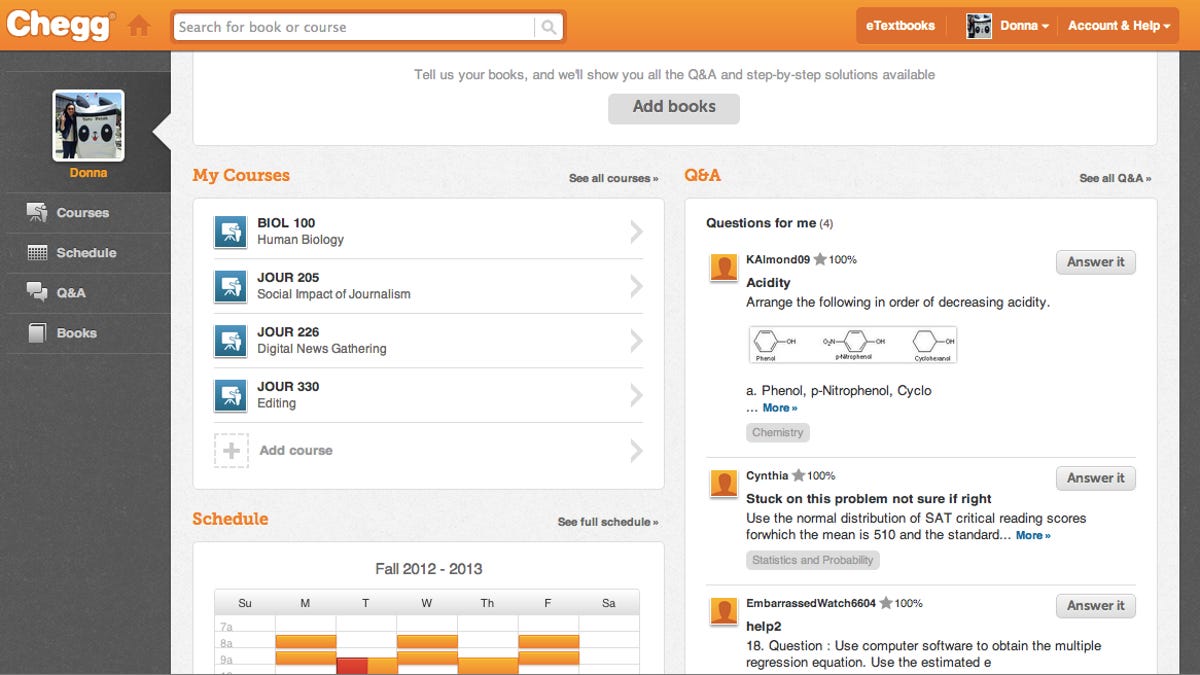Textbook seller Chegg sets sights on the 'student graph'
The textbook site wants to be more like Facebook or LinkedIn for students, but with a focus on educational services and a social graph that connects students.

Amazon textbook rentals don't scare Chegg CEO Dan Rosensweig -- the well funded startup has grand plans of its own that it believes will propel it into a whole new league.
Chegg, which started as a textbook purchase and resale service for students, has set its sights on expanding what Rosensweig calls a "student graph," a social network for students that aids them in college planning and studies, from high school to college graduation and beyond.
The student graph aims to connect students in the Chegg network, similar to Facebook and other social networks. Rosensweig expects that student graph to turn Chegg into a comprehensive hub for students. For example, students could directly connect via the Chegg network to those who have received high marks in courses and ask them for help.
The infrastructure already exists -- students can connect to others through Chegg's homework help feature and they can list their grades for classes. There's even a newsfeed of sorts on each student's Chegg homepage showcasing homework questions and answers, but Chegg's vision for the future involves creating more deliberate connections.
"The priority is not to get you a date," Rosensweig said, maintaining that Chegg is more like LinkedIn than Facebook, with its focus on solely on students and education.
"We're competing with the college book stores, but book stores don't have any of the graph information we have.... If the student graph does what it's suppose to do, we won't have competition," he added.
While there are many sites that sell or rent textbooks -- such as Amazon, Barnes and Nobles and BookRenter -- fewer organizations are focused on creating academic social networks. Edmodo is an education network that allows students and teachers to interact on subjects and homework help, but it's aimed at K-12 students, and Student Circle Network has similar features (sans textbooks) but they are not as extensive as Chegg's.
Currently, the company offers homework help, class scheduling and scholarship information, in addition to selling, renting and repurchasing textbooks. It's quirky marketing stunts-- including tour bus visits and free concerts on campuses, and even Rosensweig recording a personal voicemail that reminds students to return their books before school starts -- seems to have sparked the interests of students.
Rosensweig said 30 percent of college students in the country have been active somewhere within the Chegg network in the last 12 months. Most of the students come for the textbook service, but in the past quarter, Cheggs says more than 75,000 students a day use its homework help services, which allows students to post and answer questions. The site helps students schedule their classes and tell them what books are required for each course. A small percentage of sales are for e-textbook, but this could change as the materials become more interactive and engaging for students.
"Our only job is to save students time, save them money, and make them smarter," Rosensweig said. In return, Chegg generates its income from textbook rentals and sales, advertising and fees for services, such as online assessment tests.
The student community is ready for more online interaction, Rosensweig said. According to a survey Chegg released today, about half of the Chegg students asked about study habits plan to use online study groups for school, and another 67 percent said they would use video tutorials to help them understand concepts. Rosensweig said the results show a real need for more digital tools and supplemental education content -- like interactive digital study guides and tutorials -- which Chegg would like to provide in the future. It may come in the form of original Chegg content or there is room for partnerships with third-party groups that already provide this content.
"Nothing is off the table," Rosenwieg said, adding that Chegg could go as far as creating a space for students to sell their old furniture as they move on from college, or create an alumni network that can lend career advice to those still in school. Chegg even has the infrastructure to handle targeted promotions.
But only if that's what students want -- students will have complete control of what services they will be delivered, Chegg's Chief Business Officer Ann Dwane said.
Chegg acquired recently Dwane's company, Zinch, which allows high school students to create profiles, apply for colleges and find scholarships. Dwane said colleges attributed 20 percent of their successful recruitment this year to Zinch, a site that has more than one million high school users. According to Chegg, this number accounts for 20 percent of U.S. high school students.
Rosensweig, the former chief operation officer at Yahoo and an executive at CNET prior to its acquisition by CBS, acknowledges that Chegg's ambitions are large scale.
"We're not going to make the same mistakes like what Facebook did," he said. Rosenweig said Facebook often added features too fast, he said. He wants to make sure Chegg takes it one feature at a time so students aren't overwhelmed.
So Chegg will continue to invest in growing its student network and online learning, and that's something a textbook seller with a warehouse or shelves full of books doesn't have.

